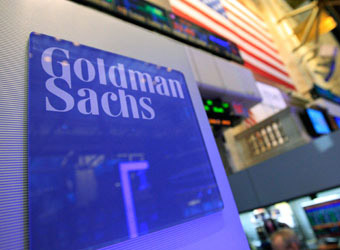Chinese stocks traded in Hong Kong will post the biggest gain since 2009 next year on prospects the economy will stabilize, Goldman Sachs Group Inc. said.
The Hang Seng China Enterprises Index (HSCEI), also known as the H-share index, will rally 18 percent to 13,600 by the end of 2014, Noah Weisberger, a New York-based analyst at Goldman Sachs, wrote in a report yesterday. The advance would be the biggest since the gauge surged 62 percent in 2009. The measure dropped 0.8 percent to 11,450.55 at the midday break in Hong Kong.
China’s manufacturing growth beat analyst estimates in November, indicating the nation’s economic recovery is sustaining momentum amid government efforts to rein in credit growth. Goldman Sachs’s H-share forecast forms part of a trade recommendation in which the bank is telling investors to buy Chinese stocks while selling copper as a bet that commodities will lag the rally in equities. Goldman Sachs called the trade its fourth top recommendation for next year.
“Equities are our favorite asset class in an environment where growth is moderate but not overheating, while policy makers remain accommodative,” Weisberger said by phone yesterday. “For the first time in the last several years, we would argue to own exposure to China through the Chinese equity market.”
China last month vowed to allow more private investment in state-controlled industries, loosen its one-child policy and better protect farmers’ rights in the most sweeping reforms in two decades. The government also pledged to elevate the role of markets in the world’s second-largest economy.
H-Share Valuation
Economists estimate gross domestic product will expand 7.5 percent next year after growing 7.6 percent this year, according to the median projection in Bloomberg News surveys last month. The government set a target for 7.5 percent expansion in 2013.
While the H-share index closed yesterday at the highest level since Feb. 20, it still traded 19 percent below its averagevaluation of the last five years, according to data compiled by Bloomberg based on estimated earnings.
“We’ve been positive for China for quite some time and it’s an overweight country for us,” Allan Conway, who oversees $27 billion as head of emerging market equities at Schroder Investment Management in London, said in a phone interview yesterday. Chinese stocks account for about 22 percent of his portfolio. “The market is attractively priced.”
Copper Bet
The Shanghai Composite Index (SHCOMP) slipped 0.1 percent to 2,205.56 today. The Bloomberg China-US Equity Index of the most-traded Chinese stocks in New York lost 0.1 percent to 108.17 yesterday while the iShares China Large-Cap ETF, the largest Chinese exchange-traded fund in the U.S., fell 0.9 percent to $39.79. The Standard & Poor’s 500 Index dropped 0.3 percent.
Goldman Sachs’s Weisberger said buying the H-share and selling copper futures may generate a combined return of 25 percent next year.
While stability in China’s growth is enough to boost “risk sentiment” after the H-share index fell 12 percent over the past three years, it’s insufficient to lift demand for copper as a supply glut weighs on the market, he said.
“We think the current context is a little bit different whereas whatever growth acceleration we are going to see in the coming year is going to be a developed market theme,” said Weisberger. “When the economic growth is driven by the developed market, it’s going to leave the commodity behind.”
Treasury Yields
Weisberger ended a recommendation to buy China’s H shares in November 2011 after the trade lost 5 percent. The Hang Seng China index rallied about 22 percent in the three months after he advised clients to exit the bet.
The H-share wager is the fourth top trade recommended by Goldman for 2014. The other recommendations include buying S&P 500 futures while selling the Australian dollar; betting European interest rate swaps will decline while five-year Treasury yields will rise; and selling the Canadian dollar.
In yesterday’s trading in New York, SouFun Holdings Ltd. (SFUN), the nation’s biggest real estate website owner, gained the most among Chinese companies, surging 11 percent to $71.85. E-House China Holdings Ltd. (EJ), a real-estate service provider, rose 6.3 percent to $11.35.
Hollysys Automation Technologies Ltd., (HOLI) an automation system manufacturer, declined 5.7 percent to $17.90. The company said on Dec. 1 that Chairman and Chief Executive Officer Changli Wang resigned. Jianfeng He, who was chief operating officer, was elected chairman, while Baiqing Shao, a senior vice president, will become CEO.
Source: Bloomberg
